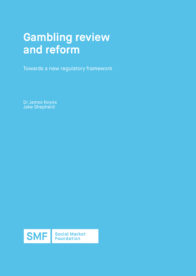This report puts forward a series of policy recommendations ahead of the Government’s anticipated review of the 2005 Gambling Act.
The Government has described the need to bring an “analogue Act” into line with the “digital age.” Online gambling – increasing both in popularity and profitability – is not subject to the same controls as equivalent land-based content. Following a series of high-profile interventions in Parliament, this report sets out the next steps. It is a roadmap for reforming the gambling industry. Its recommendations are designed to create fairness in the market, better regulation, and ensure that fewer people are subjected to the pain of gambling-related harm.
Key points
- Gambling licenses – The integrity of British gambling licences has been eroded by a combination of regulatory failure and industry malpractice. The report makes recommendations for how confidence and credibility in British gambling licences can be regained. Specifically, it proposes the introduction of a mandatory kitemark for all licensed operators; it calls for an end to the so-called ‘white label’ scheme; and it highlights the need for a transparent system of regulatory sanctions, in line with best practice in other sectors.
- Gambling content – The report advocates the introduction of a system of controls for remote gambling, based around limits on the stake and speed of play. For online slot content, the report acknowledges the regulatory reality of stake limits within a now-established spectrum of possibility of between £1 and £5. For online non-slot content, the report accepts that similar limits would make that content commercially non-viable, and the authors advocate limits to game design instead.
- Gambling affordability – The report puts forward a working definition and model of affordability based on an analysis of income and living standards. Drawing on analysis of this data, the authors recommend the introduction of a ‘soft cap’ limit of £100 per month on net deposits. This cap reflects the reality of what the majority of gamblers already spend, accommodates a ‘socially acceptable’ threshold of leisure spending, and ensures that gambling spend does not exceed poverty thresholds for lower income households.
- Gambling tax – The report recommends that Government should review all gambling taxation since the 2014 Gambling (Licensing and Advertising) Act. Government should make an assessment of potential changes to gambling duty in relation to the onshore ‘footprint’ of operators, defined in terms of a minimum threshold of capital, human, social, legal and digital presence in the UK.
- Regulatory framework for gambling – The authors argue that the existing tripartite regulatory arrangement (Gambling Commission, Advisory Board for Safer Gambling, and GambleAware) should be replaced with a new cross-departmental ‘Gambling Quartet’. DCMS would no longer be the sole government department responsible for gambling. The new Quartet would include the creation of: a Gambling Licensing Authority (replacing the Gambling Commission), sponsored by the MOJ; a new Gambling Ombudsman, sponsored by BEIS; the funding and commissioning of Research, Education and Treatment channelled via a statutory levy through the NHS and UK Research Councils, under the sponsorship of DHSC; and the oversight of advertising, the Lottery, and sporting and cultural events relating to gambling retained under DCMS.
Since the publication of this report, the Government has announced its review of the 2005 Gambling Act, whilst the Gambling Commission has opened a consultation on remote customer interaction. Please click here to read the Social Market Foundation’s evidence provided to the Gambling Commission’s consultation.

